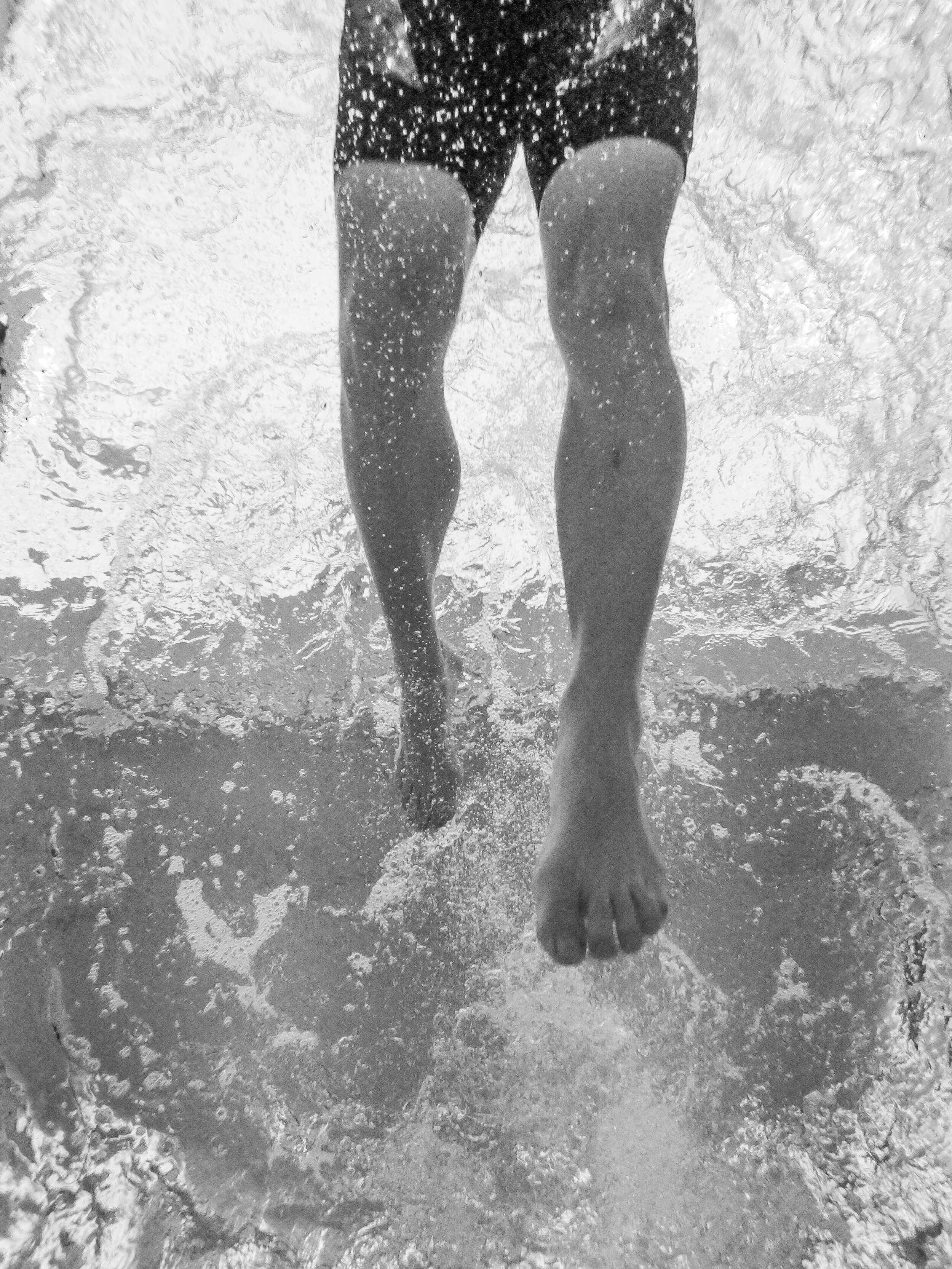Athlete Next Door - Steven Mortinson
“Story is everything”
Steven Mortinson is a creative director, filmmaker, and photographer from Portland, OR. You’ve likely seen his work for Territory Run Co and Wy’East Wolfpack, and if you’ve run a trail race presented by Daybreak Racing, you’ve likely seen Steven on the course shooting photos.
An accomplished endurance athlete in his own right, Steven has run a number of 50ks, 50 Milers and adventure runs. In 2019 he ran his first 100 mile race, the infamous HURT 100 in Hawaii. His fitness allows him to keep pace with top performers and tell compelling visual stories.
I’ve been inspired by Steven’s storytelling ability as well as his willingness to continuously embrace new creative projects and the vulnerability he shows in sharing his work. He wholeheartedly embraces a growth mindset and has an impressive drive to make himself and his work better.
We spoke about Steven’s lighthearted approach to life, how failure has always been a fuel source for him, and his advice for other people looking to access their own creativity.
Note: Unless noted, all photos by Steven Mortinson
“I've always been eager to share, sometimes to a fault. You have to realize it's always going to be temporary and you can always adjust and fix.”
“Adversity makes me happy. It’s a funny thing to say, but I enjoy being miserable.”
“The greats weren’t great because at birth they could paint, the greats were great because they paint a lot”
“‘Do the work’ is a huge motto in my life”
JT: You recently did a fun video segment for Instagram about you trying to run a five minute mile and called it ‘Breaking Five’. What inspired that project?
Steven: Everybody’s heard of Nike’s ‘Breaking 2’ marathon project and all the hype behind it, but a five minute mile is a doable thing for the average amateur athlete. They can train and get to a five minute mile. I just wanted to see if I could do it.
JT: When you were putting it together how much of it was a creative challenge for yourself and how much of it was a challenge thinking about other people and how you could inspire them?
Steven: We're in this quarantine and I got the urge to do something creative and my daughter is out of school because schools are all closed right now, so she was my director of photography. It was a fun creative project to put together in half a day. I think people need something fun right now to get their mind off (the pandemic). I didn't take it seriously at all.
JT: You do some incredible work, at the same time you don't take yourself too seriously and you have a lot of fun with some of your projects. Do you have any words of advice for someone like me who tends to be a little too sincere?
Steven: I've always been eager to share, sometimes to a fault. You have to realize it's always going to be temporary and you can always adjust and fix. For me the priority is getting something out there and then if I need to fix it then I do, I'm never too worried that it's going to destroy my career or whatever.
JT: Has there been something that got you to start working or thinking that way or has it always been that way for you?
Steven: I think that's just the way I am. I recognize that I want to get something out and so I might as well just start doing it today, what's the point of holding back? If you know that decision is going to change your life in a positive way then why not?
JT: Well because it's scary that's why not (laughing)
Steven: but in the end what is there really to lose? Maybe you lose some money, maybe you lose some time, but a week or two later it'll be gone.
JT: That idea is liberating because it gives you the freedom to fail at some things.
Steven: Yeah, failure is totally necessary. I think failure leaves you wanting. You don't finish something and you're hungry, you want that feeling of completion and so you go after it with a renewed sense of urgency. Failure has always been a fuel source for me.
JT: You do a lot of these adventures yourself, how has your passion for outdoor adventure fed in with your passion for creative outdoor filmmaking and photography?
Steven: I think I lean naturally towards documentary style filmmaking and photography, I like real stuff. On these types of adventures people are pushing themselves past their limits and I think that's such a real emotion and thing that people can relate to. Those kinds of things are what I like to capture because I want people to feel something when they see an image. "I wish I could be there" "I want that feeling too”.
JT: On your website you have the quote “Story is everything" why are stories so powerful?
Steven: Everyone has their own story. Something about the human condition is storytelling. Generations and generations of humans have passed down stories and it's always been through word-of-mouth, just in the last century we started using pictures and video.
JT: Do you have any tips for people who are interested in telling better stories?
Steven: When I’m teaching photography I always say you want to capture people, place, and thing. I know that's the most basic example but people forget that. Also, everything has to have a purpose. I don't want people to get to the end of the film or photo essay of mine and say "OK, what was the point of that?” They should come out of it with something. If you want to document a trip, there should be a “Why”.
JT: What do you look for in adventure partners?
Steven: When it comes to adventure partners you have to have a good connection with that person. Number one is that you have to be able to roll with the punches. You can have fun even when you're miserable, you can smile even when you're miserable. There are going to be problems on adventure, if there aren't any problems then it wasn't an adventure.
Also, you have to be a good communicator because you're going to be in some dangerous situations at times and maybe you don't feel comfortable, you need to tell the people you're with you don't feel comfortable. Don't just try to get through it. It's like a marriage in a way.
JT: Are there things that you found that make adversity easier to handle?
Steven: Positive thinking is key. You have to be optimistic that you're going to get out of the situation in order to get through it.
JT: In the last five years what have you become better at saying no to?
Steven: I’m better at saying no to jobs. I don’t want to get pigeonholed as a filmmaker/photographer into a certain genre. I also don't want to shoot things that I don't think have any meaning. So I've gotten better at saying no to things that don't interest me. When I take a job there are three criteria that I think about and the job needs to fulfill two of the three criteria for me to take it. The three criteria are: 1) It's going to be fun 2) It's going to pay well and 3) it's going to get me good connections for future jobs. In the past I wasn't good at saying no and I would take jobs that made me miserable.
JT: Do you have any thoughts for people who are looking to tap into their creativity?
Steven: For creativity, I think you just need to make stuff and do stuff and it's going to fall into place. Unless you put the time in you're not going to get any better. I like the Macklemore quote "The greats weren't great because at birth they could paint, the greats were great because they paint a lot." People don't magically become great, they work their butts off and they fail a lot. "Do the work" is a huge motto in my life.
Steven’s Recommendations
Books
Endure - Alex Hutchinson (Science of Endurance)
Tribe - Sebastian Junger (Community and Connection)
Finding Ultra by Rich Roll (Overcoming Your Limits)
Cobra and Cobra Strike by Timothy Zahn (Science Fiction)
What I Talk About When I Talk About Running - Haruki Murakami
Podcasts
Comedy Bang Bang (Pure Stupid Fun)
How did this get Made? (Analyzing Terrible Films)
99% Invisible (Design)
Radio Lab
Conan Needs a Friend (Conversations with Influential People)
Learn More about Steven and his projects
Instagram @stevenmortinson and @sweatysteven
Vimeo @StevenMortinson - Rideable and many other films available here
See Daybreakracing.com for an extensive collection of Steven’s race photos












